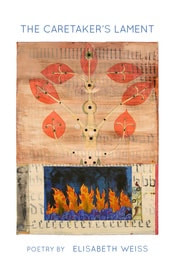Collections
The Caretaker's Lament available from Finishing Line Press
----Review of The Caretaker's Lament by Doug Holder
The Anna Fragments published by Talking Writing, Winner of the 2015 Talking Writing Prize for Hybrid Poetry
----Review of hybrid forms in The Anna Fragments by Alina Stefanescu
----Review of The Caretaker's Lament by Doug Holder
The Anna Fragments published by Talking Writing, Winner of the 2015 Talking Writing Prize for Hybrid Poetry
----Review of hybrid forms in The Anna Fragments by Alina Stefanescu
Interviews
Poems
“My Mother as Warrior for God", “Saratoga Racetrack", “My Mother on the Soccer Field", “After Fifty" & “Lost Footage" published in Lothlorien Poetry Journal
“Hungry Lions" published in Eucalyptus Lit
“Dance and Burn", “Though I Walk in the Shoes of Auschwitz" & “Paradise in Ruins" published in Sheila-Na-Gig
“Promise" a collaborative poem with Liz Stein published by The Woodberry Poetry Room
“Raising Sons", “The Resurrection" & “Unset in Stone" published in Molecule: a tiny lit mag
“Island Song" published in Writing In A Woman's Voice
“The Teaching Hospital" & “Gazelle" published in Please See Me
“Still Life with Cabbage and Clogs" published in The Ekphrastic Review
“Lost Mother" published in MER
“Lost Mother", “He Skates", “Heartland", “To Myself at Twenty-One" & “The Four in Hand" published as the poetry feature in The Muddy River Review
“This Room, This Chair" published in The Amethyst Review
“The Bicyclist" published in Mass Poetry's Poem of the Moment series
“Hungry Lions" published in Eucalyptus Lit
“Dance and Burn", “Though I Walk in the Shoes of Auschwitz" & “Paradise in Ruins" published in Sheila-Na-Gig
“Promise" a collaborative poem with Liz Stein published by The Woodberry Poetry Room
“Raising Sons", “The Resurrection" & “Unset in Stone" published in Molecule: a tiny lit mag
“Island Song" published in Writing In A Woman's Voice
“The Teaching Hospital" & “Gazelle" published in Please See Me
“Still Life with Cabbage and Clogs" published in The Ekphrastic Review
“Lost Mother" published in MER
“Lost Mother", “He Skates", “Heartland", “To Myself at Twenty-One" & “The Four in Hand" published as the poetry feature in The Muddy River Review
“This Room, This Chair" published in The Amethyst Review
“The Bicyclist" published in Mass Poetry's Poem of the Moment series
Reviews
"Review: A Sand Book" published in Molecule: a tiny lit mag
“Bits of Flynn: On Rereading Festival Poet Nick Flynn's 'Some Ether'" published by Mass Poetry
“The Making and Unburying of Salem Poet Malcolm Miller" published in The Brooklyn Rail
“Bits of Flynn: On Rereading Festival Poet Nick Flynn's 'Some Ether'" published by Mass Poetry
“The Making and Unburying of Salem Poet Malcolm Miller" published in The Brooklyn Rail
